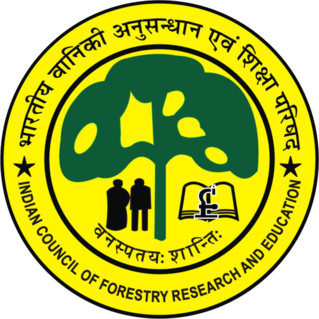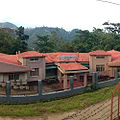Top Qs
Timeline
Chat
Perspective
Indian Council of Forestry Research and Education
Autonomous governmental agency From Wikipedia, the free encyclopedia
Remove ads
The Indian Council of Forestry Research and Education (ICFRE)[2][3][4] is an autonomous organisation[5][6] or governmental agency under the MoEFCC, Government of India. Headquartered in Dehradun, its functions are to conduct forestry research; transfer the technologies developed to the states of India and other user agencies; and to impart forestry education. The council has 9 research institutes and 4 advanced centres to cater to the research needs of different bio-geographical regions. These are located at Dehradun, Shimla, Ranchi, Jorhat, Jabalpur, Jodhpur, Bengaluru, Coimbatore, Prayagraj, Chhindwara, Aizawl, Hyderabad and Agartala.[7] It's also the administrator and implementor of India's Green Credits Program.[8]
Remove ads
History
ICFRE is the largest organisation responsible for forestry research in India.[3][9] ICFRE was created in 1986, under the Central Ministry of Environment and Forests (Indians), to direct and manage research and education in forestry sector in India.[citation needed] ICFRE is headed by a Director General with headquarters at Dehradun.[citation needed] ICFRE became an autonomous council under the Ministry in 1991.[10]
Remove ads
Mandate
The mandate of the ICFRE is to organise, direct and manage research and education in the forestry sector,[11] including in cooperation with FORTIP (UNDP[12]/FAO Regional Forest Tree Improvement Project), UNDP and World Bank on economically important species. ICFRE established a National Bureau of Forest Genetic Resources (NBFGR).[13][14]
Research perspective
- Conservation, protection, regeneration, rehabilitation and sustainable development of natural forest ecosystems.
- Revegetation of barren, waste, marginal and mined lands.
- Research on tree improvement.
- Enhancing productivity of wood and non-wood forest produce per unit of area per unit time by application of scientific and technological methods.
- Research on improved utilisation, recovery and processing of forest produce for value addition and employment generation.
- Ecological rehabilitation of all fragile ecosystems, such as mountains, mangroves, deserts etc.
- Socio-economic and policy research for developing strategies towards attracting people's participation in forest management.[citation needed]
Remove ads
Research institutes
Advanced research Centres
Remove ads
See also
- Afforestation
- Air pollution in India
- Central Pollution Control Board
- Communal forests of India
- Conservation reserves and community reserves of India
- Director General of Forests
- Environmental issues in India
- Forest management
- Forest produce (India)
- Forest range officer
- Forest Survey of India
- Indian Forest Act, 1927
- Indian Forest Service
- Indian Institute of Forest Management (IIFM)
- Indira Priyadarshini Vrikshamitra Awards
- Joint Forest Management
- List of forest research institutes
- List of forest research institutes in India
- Reserved forests and protected forests of India
- Social forestry in India
- Tropical rainforests of India
- Urban forestry
- Wildlife Institute of India (WII)
- Wildlife of India
- Rain Forest Research Institute
Remove ads
References
External links
Wikiwand - on
Seamless Wikipedia browsing. On steroids.
Remove ads









